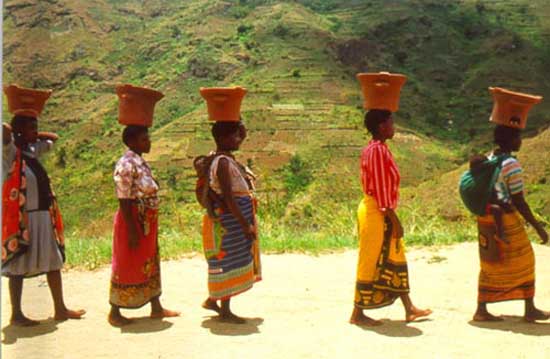
“With better nutrition and health care you can better climb out of the poverty trap,” said Pelletier, a 2004 Wesleyan University graduate. “AIDS is a realistic problem, but everything is tied together – social, economic, education and health.” He said women in Masasi want to learn and be educated so the likelihood of positive results is high. “They will walk all morning to hear an educator,” said Pelletier who has grown to be part of the community there and has learned the local languages. “They don’t expect to come for food, lunch or snacks, they come for the information.”“This experience has changed my whole perspective,” said Pelletier. “You go over thinking you’re going to change the world and you realize you’re the one who will change.”
Joshua Pelletier has been the driving force behind a roughly $170,000 community project in Masasi with the Masasi Women’s Development Agency (MAWODEA) to educate and assist people living with HIV and AIDS as it relates to nutrition in Tanzania
Pelletier hopes nutrition education will help fight AIDS in Tanzania
By MICHELLE HOPEY, Telegraph correspondent
Published: Monday, Jan. 1, 2007
AMHERST – When Joshua Pelletier joined the Peace Corps, he was a fresh college graduate eager to explore the world and make a difference.
“I was just going over there to do what I could do,” said the 25-year-old.
But after living in the African country of Tanzania for two years, the Amherst native’s role in the world – and especially in Masasi, Tanzania – has grown into something much larger than a simple volunteer.
Pelletier has been the driving force behind a roughly $170,000 community project in Masasi with the Masasi Women’s Development Agency (MAWODEA) to educate and assist people living with HIV and AIDS as it relates to nutrition in Tanzania.
The project, scheduled to get under way this month, is a two-step process. The first phase is to hold seminars on food, nutrition, health and education and how it relates to HIV and AIDS, which 12 percent of Masasi’s 84,000 people are suffering from, said Pelletier, who completed his Peace Corp commitment in November and returned to Amherst.
The second part of the initiative will be to document the seminars and work by film so that the women of MAWODEA can continue to educate other women across the region by distributing it.
While this project spun-off from his time as a health educator in the Peace Corps, it is a separate project and Pelletier is navigating it. It has been up to him to secure the necessary funding to implement the project.
In November, as Pelletier was returning to Amherst, MAWODEA, with instrumental help by Pelletier, secured a $128,000 grant from the Tanzania Commission for AIDS to implement the first phase of the project. The funding, however, is specifically for the seminars and does not include any money for the second phase of the project.
But thanks to the Rotary Club of Nashua West’s Feed the Hungry program, $3,000 has been allocated to help create the 90-minute film and distribution process as a way to help battle hunger by providing nutritional information.
Since his mother, Sandy, is a member of Rotary West, Pelletier was familiar with the Rotary’s international and local community work. Feed the Hungry is a Rotary program that budgets $10,000 for local and international organizations to fight hunger.
“We just think the work that Joshua has done is remarkable and he is just so passionate about it,” Kathleen Regan, immediate past president of Rotary West and a board member.
Regan said it is the Rotary’s goal to provide community service locally and abroad and that Pelletier enlightened her to see the problems in Tanzania, fueling the Rotary in their decision to help.
“The fact that he has had the tenacity to work hard to make it a success – that someone his age is pursuing a project of this sort and enormity is really amazing,” she said.
“It’s important for me to return for one more year to see where we are at, a lot depends upon what happens throughout the year,” said Pelletier who is working on getting a permit to work with the MAWODEA for his return.
In order to return to Tanzania, Pelletier is also trying to raise $41,000 which will cover the cost for all of the video equipment, his airfare, insurance, and the cost of living for his time in Tanzania.
Pelletier said it is the teaching of nutrition and health that can help people
of Masasi live longer lives in the face of AIDS and that the education of women is even more important.
“Women in Tanzania have such a big influence on food production and care for families,” he said. “We need to give them education that will be directly beneficial.”
He said corn is a main staple in the Masasi diet and it is eaten strictly to fill people up. It is also one of the most plentiful crops there. Teaching the Masasi and area communities that fruits and green leafy vegetables are a more nutritious option is essential, he said.
“With better nutrition and health care you can better climb out of the poverty trap,” said Pelletier, a 2004 Wesleyan University graduate. “AIDS is a realistic problem, but everything is tied together – social, economic, education and health.”
He said women in Masasi want to learn and be educated so the likelihood of positive results is high.
“They will walk all morning to hear an educator,” said Pelletier who has grown to be part of the community there and has learned the local languages. “They don’t expect to come for food, lunch or snacks, they come for the information.”
However, MAWODEA does not currently have the technical know-how to film and edit the raw footage of their work into a finished documentary so they can proceed with educating others. Yet, another reason Pelletier has been asked by the group to return.
When completed, MAWODEA and Pelletier will distribute the video throughout East Africa, making it available as a health education tool for U.S. Peace Corps volunteers, development workers and other HIV/AIDS prevention workers. In addition, the video will also be available for purchase through the Media for Developmental Trust.
“This experience has changed my whole perspective,” said Pelletier. “You go over thinking you’re going to change the world and you realize you’re the one who will change.”
















